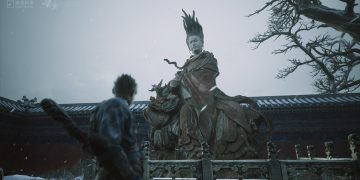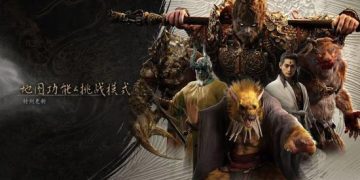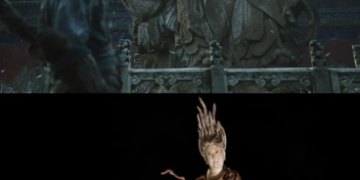The release of “Black Myth: Wukong,” a game featuring a personified monkey protagonist, has sent shockwaves through the gaming community in China and internationally. Amidst its massive success, the game has also ignited a heated debate, not only about its artistic and commercial triumphs but also concerning censorship and cultural representation.
A Monumental Success in the Gaming World
Within just 24 hours of its launch, “Black Myth: Wukong” became the second most popular game on Steam, amassing over 2.1 million concurrent players and selling over 4.5 million copies. Its massive success extended beyond mere numbers, as the game generated an impressive $53 million in pre-sales alone. But its rise to fame wasn’t only due to gameplay mechanics or visuals; it also struck a cultural chord that resonated deeply with a global audience.
Based on the 16th-century Chinese literary classic *Journey to the West*, the game draws inspiration from the iconic character of Sun Wukong, the Monkey King. The narrative weaves together Chinese mythology, Confucianism, Taoism, and Buddhism, all while presenting a fresh and visually stunning action RPG experience. Internationally, it has been hailed as a rare example of successfully bringing a Chinese story to a global stage.
“Black Myth: Wukong” marks a significant milestone for the Chinese gaming industry as the first AAA game developed locally. The game was initially teased with a popular trailer in August 2020, and after four years of anticipation, it was officially launched last week. With its breathtaking visuals, intricate gameplay design, and strong promotional campaigns, it represents the growing sophistication and ambition of the Chinese gaming sector.
A Glimpse Into Chinese Culture and National Pride
For many, the game’s success is more than just a commercial achievement; it has become a source of immense national pride. As the game features various iconic locations from *Journey to the West*, including mythical temples and landscapes, Chinese tourists have flocked to these real-life destinations, spurred by a renewed interest in their cultural heritage. The Shanxi Provincial Cultural and Tourism Department even released a video showcasing the game’s depictions of these sites, sparking what some have referred to as a “Wukong tourism craze.”
Furthermore, industry analysts from Niko Partners have noted that the game serves as a cultural ambassador for China, introducing global audiences to Chinese mythology, traditions, and real-world locations. This aligns with China’s broader efforts to boost soft power through its entertainment and media exports.
Controversy: Censorship and Cultural Sensitivities
Despite the game’s undeniable success, it has not been free from controversy. The most significant issue centers around a leaked document reportedly sent to streamers and content creators by the game’s publishers, instructing them not to promote “feminist propaganda” or discuss topics related to gender objectification. The guidelines also banned the discussion of politics, the COVID-19 pandemic, and certain sensitive issues regarding China’s game industry policies.
Though the exact meaning of “feminist propaganda” remains unclear, the move sparked backlash, particularly in the international gaming community, where accusations of censorship and suppression of free speech began to circulate. The controversy deepened after an investigative report by IGN revealed that the studio behind *Black Myth: Wukong*, Game Science, had a history of gender-related misconduct within its workplace.
This censorship controversy gained further attention when some content creators defied the guidelines. A Twitch streamer named Moonmoon hosted a “Black Myth: Wukong” session titled “Covid-19 Quarantine Taiwan (A Real Country) & Feminist Propaganda.” Similarly, streamer Rui Zhong discussed China’s one-child policy during a live session of the game, raising concerns about how the game’s developers were attempting to control discourse surrounding the game.
As a result of these incidents, Chinese social media platform Weibo banned 138 users who had allegedly violated the platform’s rules while discussing the game. According to *Global Times*, the banned users included those spreading “irrational opinions” related to gender equality and personal attacks, highlighting the government’s continued control over online narratives.
The Bigger Picture: A Clash of Censorship and Creative Expression
While these controversies may have stirred global debate, they did little to dampen the game’s commercial success or its critical acclaim. On platforms like Weibo, Reddit, and YouTube, the majority of feedback has been overwhelmingly positive, with many praising the game’s storytelling, innovation, and gameplay. In fact, some believe that the controversy has been blown out of proportion and is secondary to the game’s achievements.
Professor Yu Haiqing, a digital media and political economist from RMIT University, suggests that the controversies surrounding the game are reflective of broader tensions in China’s digital landscape. While censorship is a sensitive topic, Yu points out that *Black Myth: Wukong* is ultimately a success in promoting Chinese culture and expanding its influence globally. She argues that the restrictions placed on public discourse about the game are more about the developers’ attempts to safeguard themselves from potential scrutiny rather than direct intervention from the Chinese government.
According to Yu, “The company likely issued these guidelines to preemptively defend itself against accusations of missteps, rather than being directed by the government itself. This is more about corporate self-preservation within the framework of China’s politically sensitive environment.”
A New Era for Chinese Gaming
In the end, *Black Myth: Wukong* represents a turning point for the Chinese gaming industry. It showcases the potential for Chinese creators to craft games that not only cater to domestic audiences but also resonate with players worldwide. The game’s success proves that China can be a significant player in the global gaming market, offering rich, culturally grounded narratives that captivate international audiences.
As controversies continue to swirl around censorship and free expression, it’s clear that *Black Myth: Wukong* has started a new chapter for both the gaming world and China’s digital media landscape. Whether or not the game can navigate these ongoing challenges without compromising its artistic integrity will be something to watch in the coming years. But for now, it stands as a testament to China’s growing influence in global entertainment.



























